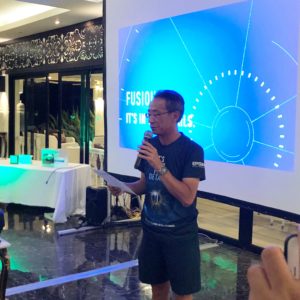Honey, that machine just printed a shirt!
An entrepreneur planning to put up a garment retailing business took to online T-Shirt Forum recently to ask: “How long does it take to do a screen print?”
He gave the details of his concern. In his business he was expecting that orders from customers would be “different” and he cannot use the same design repeatedly. He was wondering about the time involved in making one t-shirt, as “I fear it might be quite a bit and should probably search other avenues.”
Many replied. “It would depend on the design,” one commented. “For one color it would take more than 20 minutes or 2 hours maximum,” another forum member chipped in.
Obviously, the would-be t-shirt retailer was staring at one big enemy: time.
A solution
Epson said an improved direct-to-garment printing (DGP) model engineered by its technical team would solve that problem.
Epson Philippines recently showcased its hottest new products – inkjet printers, projectors, point-of-sale printers, signage printers and smart glasses – at the Fusion 9 event held recently in Balesin Club.
But it was the SureColor F2130, a souped-up DGP, that stole the show.
At the gathering, Epson Philippines presenters said the SC-F2130 was engineered to meet the needs of the garment printing sector, promising that the machine can produce a minimally designed t-shirt in “seconds” without sacrificing quality.
In the demonstration, an operator linked a computer containing the art design – a resized playing card image – to the machine. He flopped a t-shirt onto the platen, tucked in the excess garment on the plate’s sides and secured it with a hoop.
He pressed a button. The platen whirred into the feeder and the printing started. The process took less than two minutes as the design was simple and had two colors – red and yellow. The shirt resurfaced instantly at the input-output tray and was placed onto a heat press. It was ready for wearing.
Bloggers and guests examined the quality of the freshly decorated shirt. The verdict: the print was clean; the colors looked vibrant.
How was that possible?
The technical staff cited Epson’s two innovations.
First was the PrecisionCore Technology that can print graphics up to 1,440 x 720dpi for remarkable quality that truly complements one’s design. The technology behind PrecisionCore included a precise dot control to create images with exceptional clarity and sharpness on the garments.
The second was the UltraChrome Direct-To-Garment Technology that printed directly onto fabric products with Epson UltraChrome DG ink, which was formulated with high-dispersion ink technology that effectively reduced white ink sedimentation to give it a very natural white color.
In the market by June
SureColor F2130 would hit the Philippine market this June, and Epson was hoping that the product would attract small to medium businesses, print companies and firms relying on shirts to promote their image.

Toshimitsu Tanaka, managing director (SE Asia), Epson Singapore and president and country manager of Epson Philippines.
Epson said the garment printer was re-engineered in keeping with its “commitment to bringing groundbreaking technologies for enterprise and business segments.”
At the presentation, the company also unveiled its new campaign: “It’s in the Details.” It highlighted the company’s approach to innovation “backed by a long history of artisanship and attention to details.”
“Epson’s obsession [with] details runs through everything we do. We believe that by taking care of the little details, we ensure to bring forth products developed solely from homegrown core technologies and devices,” said Eduardo Bonoan, Director of Marketing Division, Epson Philippines.
Bonoan explained that today’s customers are hungry to see more from businesses. “With technology today enabling personalized, valuable, and real-time experiences, companies need to adopt new technologies to exceed customer expectations and thrive in the ever-changing digital economy,” he said.
Meanwhile, Toshimitsu Tanaka, managing director (SE Asia), Epson Singapore and president and country manager of Epson Philippines, expounded the company’s “It’s in the Details” battle-cry.
“What customers get from our products and solutions come from the details we put into them. Our obsession [with] details enables us to turn big ideas into reality. It also gave us the opportunity to expand our portfolio of innovative products, dedicated to making lives simpler and easier,” he said./ac